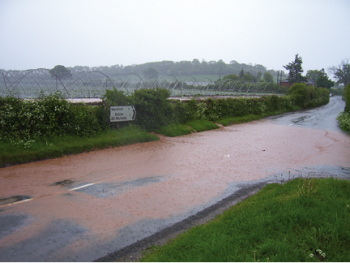You are here
Angling & The Environment
Anglers have always been the first to notice when rivers and stillwaters are suffering from pollution or over abstraction. Their keen eyes and ears are needed more than ever.As with most fieldsports, angling is dependent on a healthy environment. The abundance, size and condition of fish are indicators of the quality and quantity of water and the health of aquatic habitats. These ingredients all need to be in place to make going fishing worthwhile and therefore Britain’s 3 million anglers are more concerned about the state of our rivers, lakes, canals and ponds than most.
Of course, clean, plentiful and wild waters are of benefit to everyone. They provide water for the home, industry and agriculture, habitats where many food chains begin and unique places for quiet reflection. They are also places which have been convenient dumping grounds for sewage, noxious chemicals and rubbish. Many rivers have dried up completely from too much water being taken out to fill swimming pools, wash cars, drip from unfixed taps and to water crops. Many others have been dredged and encased in concrete to try and stop them flooding or drain fields. All these things cause fish numbers to decline.
The way we look after water affects not just fish, but also our families’ health and well-being, the whole economy and the risk of homes being flooded. Angling is a very obvious direct example: it generates about £3.5 billion for the UK economy each year and employs tens of thousands of people. It provides a healthy, outdoor activity in city, town and country which can be practiced by anyone between the ages of 3 and 103. It instils in youngsters a great understanding of the natural world and the mysteries of life beneath the water, without them having to go to a coral reef.
An angler is someone who fishes with a hook. Over the past 10,000 years, a huge number of ways of using hooks to catch fish have been developed and this is apparent from the daunting array of equipment in fishing tackle shops, which is the best place to go for anyone wanting to get started. The good news is, you don’t have to buy everything in the shop and for less than £50 you could get enough kit to go fishing for either coarse, game (trout & salmon) or sea fish. Anyone over 12 years old also needs an Environment Agency licence to fish. Daily, weekly and annual licences are available online and from most Post Offices.
Apart from tackle and a licence, anglers need clean, plentiful, wild water with fish in them. The ACA has been fighting for this right for nearly 60 years, by using the law to make polluters pay for the damage they do to our members’ waters. Our in house lawyers represent our 1,000 member angling clubs and river owners completely free of charge. We have won more than 2,000 legal cases and have secured millions of pounds in compensation which has been used by our members to restore their damaged fisheries. In 60 years, we have lost only 3 cases. Our reputation means that many thousands of pollution incidents have been avoided as water companies, farmers and industrial plants have thought twice before using rivers as dumping grounds.
Thankfully, much of worst pollution has now been stopped and many of our rivers are seeing fish populations on the increase. When people imagine pollution, they think of big pipes spewing out poisons and sewage. In fact, this type of damage is now much rarer, but still happens sometimes. However, new problems have arisen which are impacting seriously on the angling economy and society as a whole. Pesticides like cypermethrin sheep dip wipe out insect life, the main food of most fish, in rivers. Endocrine disruptors washed out of sewage works make male fish become female. Silt pollution from construction and agriculture increases flood risk, puts up the cost of treating water for public supply, smothers gravels where fish breed and insects live and makes it necessary to dredge estuaries and ports much more often, which is both expensive and damaging to these sensitive habitats. What looks like a bit of harmless mud causes millions of pounds of damage to river systems.
The average person’s water consumption has increased by 30% since 1970. If we continue to waste water in this way, the construction of millions of new homes in already water-stressed areas will put great strain on the ability of natural water systems to support fish, other wildlife and other uses of water. Similarly, all this new development will mean a lot more hard, impermeable surfaces like roads, driveways and roofs. Instead of soaking into the ground, rain landing on these surfaces rushes towards the nearest drain to be carried efficiently to the nearest watercourse. Unless these new developments are designed sensibly, with sustainable drainage systems and the latest water efficiency technology, Britain is on a collision course for widespread water shortages and hugely damaging flooding. We got a taste of both these future scenarios in the last two years, with drought in 2006 and floods in 2007.
To make a difference, all anglers should join one or more of the bodies which represents their interests. The Fisheries and Angling Conservation Trust (FACT) has a list of all the angling organisations on its web site at www.factuk.co.uk. Membership of the ACA is just £22 a year for individuals, £6 for juniors and more for angling clubs and riparian owners who benefit from our unique legal protection service. More information at www.a-c-a.org or from 01568 620447.
